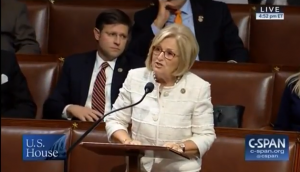 Yesterday, President Donald Trump signed into law the SUPPORT for Patients and Communities Act (H.R. 6), the most comprehensive legislation ever passed by Congress to combat a single drug crisis. The bipartisan, bicameral bill contains two pieces of legislation authored by Congressman Diane Black (R-TN-06) to prevent opioid addiction and educate communities about the dangers of prescription drug abuse.
Yesterday, President Donald Trump signed into law the SUPPORT for Patients and Communities Act (H.R. 6), the most comprehensive legislation ever passed by Congress to combat a single drug crisis. The bipartisan, bicameral bill contains two pieces of legislation authored by Congressman Diane Black (R-TN-06) to prevent opioid addiction and educate communities about the dangers of prescription drug abuse.
Congressman Black released the following statement:
“The opioid crisis is a personal one. It hits far too close to home in our communities nationwide and especially in Tennessee. As a nurse, I have been trained to think about the root causes of a problem and how to build a treatment strategy from the ground up – while there is no single legislative fix to this epidemic, the package signed into law today addresses the underlying causes of addiction to prevent it before it takes hold. I firmly believe that we must treat those who are addicted to opioids as patients who can recover, and I am proud to work alongside the President and my colleagues to fight back against this cruel epidemic.”
Background:
The Education for Disposal of Unused (EDU) Opioids Act of 2018 (H.R. 5714) requires Medicare Advantage (MA) plans to have an in-home conversation with beneficiaries regarding proper disposal techniques and Drug Takeback Programs in their area. The provision also requires MA plans to provide guidance on cost-effective means for proper disposal through the Medication Therapy Management Program.
Currently, the Centers for Medicare & Medicaid Services (CMS) partially bases its calculation for Medicare reimbursement payments to hospitals on results from the Hospital Consumer Assessment of Healthcare Providers and Systems (HCAHPS) survey provided to a sample of inpatient discharge patients. The survey consists of 25 questions – including three related to pain management for the purpose of measuring facility performance – which could potentially result in healthcare professionals overprescribing medication for patients. The Reduce Overprescribing of Opioids in Treatment (ROOT) Act of 2018 (H.R. 5719) addresses this issue by instructing the Department of Health and Human Services (HHS) to either eliminate the pain questions altogether, or revise the existing questions to ensure patients who are prescribed opioids are educated by the hospital about both opioid risks and non-opioid pain management alternatives.
Congressman Diane Black represents Tennessee’s 6th Congressional District. A nurse for more than 40 years, she serves as a member of the House Budget Committee and the Ways and Means Committee.